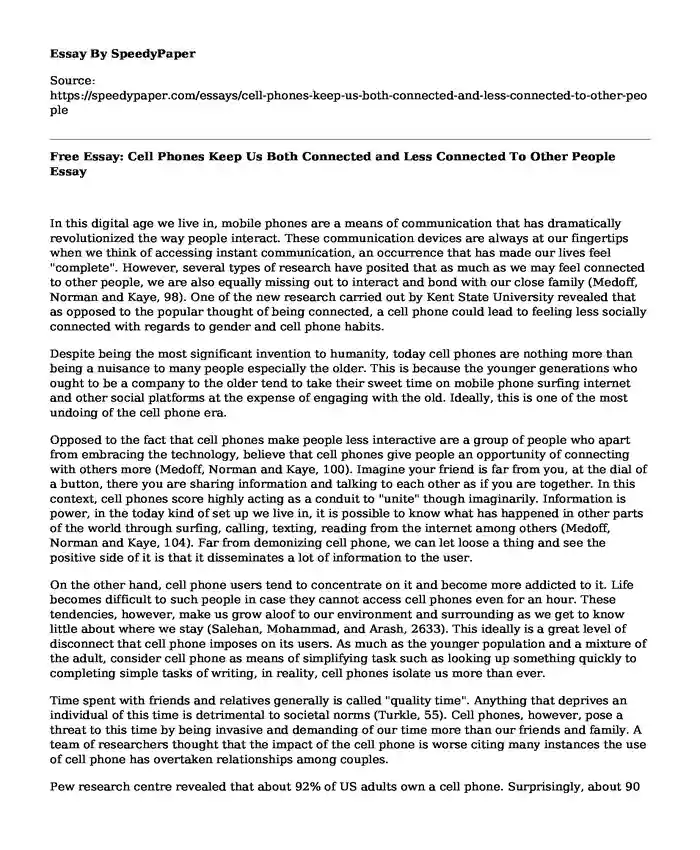
| Type of paper: | Argumentative essay |
| Categories: | Information technologies Interpersonal communication |
| Pages: | 3 |
| Wordcount: | 800 words |
In this digital age we live in, mobile phones are a means of communication that has dramatically revolutionized the way people interact. These communication devices are always at our fingertips when we think of accessing instant communication, an occurrence that has made our lives feel "complete". However, several types of research have posited that as much as we may feel connected to other people, we are also equally missing out to interact and bond with our close family (Medoff, Norman and Kaye, 98). One of the new research carried out by Kent State University revealed that as opposed to the popular thought of being connected, a cell phone could lead to feeling less socially connected with regards to gender and cell phone habits.
Despite being the most significant invention to humanity, today cell phones are nothing more than being a nuisance to many people especially the older. This is because the younger generations who ought to be a company to the older tend to take their sweet time on mobile phone surfing internet and other social platforms at the expense of engaging with the old. Ideally, this is one of the most undoing of the cell phone era.
Opposed to the fact that cell phones make people less interactive are a group of people who apart from embracing the technology, believe that cell phones give people an opportunity of connecting with others more (Medoff, Norman and Kaye, 100). Imagine your friend is far from you, at the dial of a button, there you are sharing information and talking to each other as if you are together. In this context, cell phones score highly acting as a conduit to "unite" though imaginarily. Information is power, in the today kind of set up we live in, it is possible to know what has happened in other parts of the world through surfing, calling, texting, reading from the internet among others (Medoff, Norman and Kaye, 104). Far from demonizing cell phone, we can let loose a thing and see the positive side of it is that it disseminates a lot of information to the user.
On the other hand, cell phone users tend to concentrate on it and become more addicted to it. Life becomes difficult to such people in case they cannot access cell phones even for an hour. These tendencies, however, make us grow aloof to our environment and surrounding as we get to know little about where we stay (Salehan, Mohammad, and Arash, 2633). This ideally is a great level of disconnect that cell phone imposes on its users. As much as the younger population and a mixture of the adult, consider cell phone as means of simplifying task such as looking up something quickly to completing simple tasks of writing, in reality, cell phones isolate us more than ever.
Time spent with friends and relatives generally is called "quality time". Anything that deprives an individual of this time is detrimental to societal norms (Turkle, 55). Cell phones, however, pose a threat to this time by being invasive and demanding of our time more than our friends and family. A team of researchers thought that the impact of the cell phone is worse citing many instances the use of cell phone has overtaken relationships among couples.
Pew research centre revealed that about 92% of US adults own a cell phone. Surprisingly, about 90 % of those owning cell phones bring with them the cell phones everywhere they go including family gatherings (Keeter and Weisel, 121). Besides, only 31% of the people would turn off their cell phones while 45% would check on an update from the phones. At the familial level, both the parents and children own cell phones, and during their free time, everyone will be glued to the cell phone, an instance that limits face to face interaction and communication.
By and large, dangers imposed on people as a result of cell phone use have far-reaching consequences in all sphere of human life. More serious is the tendency of outdating face to face interactions and keeping individuals isolated from others without them knowing (Keeter and Weisel, 126). Despite cell phone creating a platform for global interaction, it has led to disconnect from within family members and friends on a higher note.
Work Cited
Keeter, S., and R. Weisel. "Building Pew Research Center's American Trends Panel." Washington, DC: Pew Res. Cent. Article Location More AR articles citing this reference New Developments in Survey Data Collection Mick P. Couper Institute for Social Research, University of Michigan, Ann Arbor, Michigan 48106 (2015): 121-145.
Medoff, Norman J., and Barbara Kaye. Electronic media: then, now, and later. Taylor & Francis, 2016.
Salehan, Mohammad, and Arash Negahban. "Social networking on smartphones: When mobile phones become addictive." Computers in Human Behavior 29.6 (2013): 2632-2639.
Turkle, Sherry. Reclaiming Conversation: The Power of Talk in a Digital Age. New York: Penguin Books, 2016. Print.
Cite this page
Free Essay: Cell Phones Keep Us Both Connected and Less Connected To Other People. (2022, Sep 28). Retrieved from https://speedypaper.net/essays/cell-phones-keep-us-both-connected-and-less-connected-to-other-people
Request Removal
If you are the original author of this essay and no longer wish to have it published on the SpeedyPaper website, please click below to request its removal:
- Fast Food Essay Example
- Business Essay Sample: Retail Grocery Business in Nelson City
- Free Essay Sample on Institutional Cruelty
- Progressive Relaxation Essay Sample
- Free Essay on How Current Theory and Research Can Explain JW's Voice Problem into Voice Disorder
- Free Essay: Changes in Immigration Law
- Free Essay Example: For Admission Committee
Popular categories




